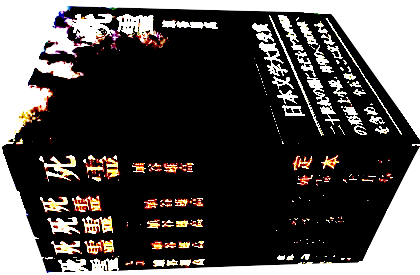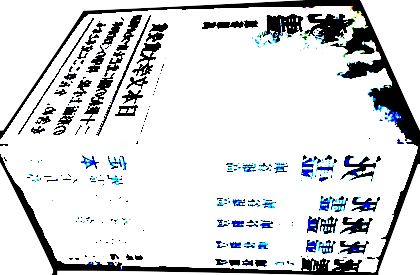死霊
Shirei, Dead spirit


死霊
Shirei, Dead spirit


以下のの項目はウィキペディア「死靈」からの引用である。
| 『死靈』(しれい)は、戦後日本の文学者・埴
谷雄高(Yutaka Haniya)の思弁的長編小説である。同作者の代表作。 |
|
| 第一章 癲狂院にて 第二章 《死の理論》 第三章 屋根裏部屋 第四章 霧のなかで 第五章 夢魔の世界 第六章 《愁いの王》 第七章 《最後の審判》 第八章 《月光のなかで》 第九章 《虚體》論―大宇宙の夢 |
|
| 本作は、戦前の日本から展開された共産主義運動の挫折[1]に大きく影
響を受けている。共産主義思想の活動家たちの地下活動とその中で交される議論を主たる題材とした小説であるが、その議論の中では、「無限大」、「存在」、
「宇宙」、「虚體」、「自同律の不快」、「のっぺらぼう」、「過誤の宇宙史」―等々独自の意味づけを与えられた命題に関して、身辺や感覚を発端として深遠
かつ壮大な形而上学的思索が繰り広げられ、極めて難解な思弁的物語、いや主題に似つかわしく物語の「非在」ともいうべき議論の応酬となっている。
昭和10年代の東京市と思われる街を舞台とするこの小説に於いて、議論の中心となるのは、「虚體」の思想を持ち「自同律」に懐疑を抱く主人公・三輪與志、
結核に罹患し瀕死の床に伏す元党地下活動家の三輪高志、「首ったけ」こと自称革命家の首猛夫、「黙狂」と呼ばれる思索者・矢場徹吾ら4人の異母兄弟であ
る。そこに與志の婚約者の津田安壽子、與志と徹吾の高等学校時代の親友の黒川建吉、徹吾が入院する精神病院の医師の岸杉夫、安壽子の父で元警視総監の津田
康造とその妻、高志の恋人でありながら高志の同志と心中した姉を持つ尾木恒子、「神様」と呼ばれる少女とその姉「ねんね」、印刷工場主で革命運動にも関わ
る李奉洋……こうした群像が存在の秘密や宇宙や無限をめぐって異様な観念的議論をたたかわせる。何十ページにもわたる独白を中心とした饒舌な文体によって
進められる非常に緩慢な時間進行の中での対話劇に、永久運動の時計台、《死者の電話箱》・《存在の電話箱》の実験、《窮極の秘密を打ち明ける夢魔》との対
話、《愁いの王》の悲劇、「暗黒速」「念速」などの概念、人間そのもの・イエス・キリスト・釈迦・さらに上位的存在への弾劾、ある種象徴的な黒服・青服に
よる「虚体」「虚在」「ない」の三者の観念的峻別についての示唆なども挿入され、一種神秘的・超常的な雰囲気さえただよう。
その一方で、議論の合間にしばしば「あっは」「ぷふい」と差し挟まれるユーモラスな間投詞や、ボートに乗った一行が肥満した安壽子の母の体重により(これ
また非常に緩慢に)ひっくり返る場面、「喰った者が喰われた者に弾劾される」というある種アニミズム的な場面などといったスラップスティックな表現もあ
る。なお、「あっは」「ぷふい」はともにドイツ語で、Achは驚きをあらわす言葉で英語のOhにあたり、Pfuiは「ちぇっ!」のように不快、嫌悪をあら
わす。
ちなみに『死靈』の異母四兄弟は、それぞれスウィンバーンのフランソワ・ヴィヨンによせた詩"Ballad of François Villon,
Prince of All Ballad-Makers" の一節、"Villon,our sad bad glad mad brother's
name!"におけるsad,bad,glad,madに、三輪与志、三輪高志、首猛夫、矢場徹吾がそれぞれ対応されている。 |
|
| 埴
谷 雄高(はにや ゆたか、1909年(明治42年)12月19日 -
1997年(平成9年)2月19日)は、日本の政治・思想評論家、作家。本名般若 豊(はんにゃ ゆたか)。 |
|
| 1909年(明治42年)12月19日(戸籍上は1910年(明治43
年)1月1日)、台湾の新竹(しんちく)に生まれる[2]。本籍は福島県相
馬郡小高町 (現・南相馬市
)[2]。父三郎の実家・般若家は代々奥州相馬氏に仕え、磐城国相馬中村藩士(剣道指南役)として明治維新を迎えた[2]。三郎は税務官吏として台湾に渡
り、後に「台湾精糖株式会社」に勤務した[2]。母方の曽祖父は薩摩藩の陽
明学者の伊東猛右衛門[2]。父の転勤に伴い、幼少期を屏東(へいとう)で
過ごす[2]。 1923年(大正12年)東京に引っ越す。 1927年(昭和2年)3月、目白中学卒業。浦和高等学校 (旧制)の受験に失敗[3]。 1928年(昭和3年) 日本大学予科に編入学。 1930年(昭和5年) 日本大学を退学。 1931年(昭和6年) 日本共産党に入党。5月、逮捕を逃れて地下生活に入る。 1932年(昭和7年)3月 小石川原町の同志宅を訪ねたところ、張り込みの警官に逮捕される。50日余りを警視庁富坂署の留置場で過ごした後、5月に不 敬罪および治安維持法違反によって起訴され、五・一五事件の日に豊多摩刑務所の拘置区へ移管され、未決囚として過ごす。独房でカントの『純粋理性批判』を 読み、終生影響される。 1933年(昭和8年) 結核により病監へ移される。2月、「天皇制を認めるならマルクス主義を奉じてもよい」と検察から説得され、転向の上申書を提出 し、11月、懲役2年・執行猶予4年の有罪判決を受けて出所。上申書の内容は宇宙論であり、「太陽系の中で地球は最初に滅亡する。天皇制はそれ以前に滅亡 するが、かなり長く続く」といったものだった(『無限の相のもとに』p.195)。 1941年(昭和16年)12月9日、予防拘禁法により特高に拘引され、年末まで豊多摩刑務所の予防拘禁所に拘留される。 1942年(昭和17年) 『ダニューブ』を翻訳。 1943年(昭和18年) 『偉大なる憤怒の書』を翻訳。 1946年(昭和21年) 山室静・平野謙・本多秋五・荒正人・佐々木基一・小田切秀雄とともに雑誌『近代文学』を創刊。畢生の大作『死靈』を連載開始。 1950年(昭和25年) 『不合理ゆえに吾信ず』を刊行。この年腸結核を患い、4年間の療養生活を送る。 1962年(昭和37年) 松田政男、山口健二、川仁宏らがを企画した自立学校において、谷川雁、吉本隆明、黒田寛一らとともに講師をつとめた。 1970年(昭和45年) 『闇のなかの黒い馬』を刊行。同作で、第6回谷崎潤一郎賞を受賞。 1971年(昭和46年) 『埴谷雄高作品集』を刊行。 1975年(昭和50年) 26年ぶりに『死靈』の第五章を発表。 1976年(昭和51年) 『死靈』全五章で日本文学大賞を受賞。 1981年(昭和56年) 『死靈』の第六章を発表。 1984年(昭和59年)『死靈』の第七章を発表。 1986年(昭和61年)『死靈』の第八章を発表。 1990年(平成2年)これまでの業績により、藤村記念歴程賞を受賞。 1995年(平成7年)『死靈』の第九章を発表。 1997年(平成9年)2月19日 脳梗塞のため[4]吉祥寺の自宅で逝去。青山墓地に葬られる。埴谷雄高忌は「アンドロメダ忌」と称されている。 1998年(平成10年) 『埴谷雄高全集』刊行開始(‐2001年)。 |
Yutaka
Haniya (埴谷 雄高, Haniya
Yutaka, December 19, 1909 – February 19, 1997) was a noted Japanese
writer and critic.[1] Haniya was born in Taiwan, then a Japanese
colony, to a samurai family named Hannya after the Hannya Shingyo
(Heart Sutra).[citation needed] He had a sickly childhood and suffered
from tuberculosis in his teens.[citation needed] Although originally
interested in anarchism, in 1931 he joined the Japanese Communist
Party, becoming its Agriculture Director the following year, whereupon
he was promptly arrested and imprisoned.[2] While in the prison's
hospital, he devoted himself to studying Immanuel Kant's Critique of
Pure Reason.[citation needed]
In 1933, Haniya underwent a coerced "ideological conversion" (tenkо̄),
after which he was allowed to leave prison and return to society.[3]
During the war years, he eked out a meager living as the editor of a
small magazine on economics and a freelance translator.[3]
During the war years, Haniya began a lengthy novel called Departed
Souls (死靈, Shirei), which he considered his life's work.[3] A pastiche
of Fyodor Dostoyevsky's novels The Brothers Karamazov and Demons,[4]
Haniya's novel was bitterly critical of the Japan Communist Party (JCP)
and the Communist International under Soviet Premier Joseph Stalin,
which Haniya viewed as capricious and cruel.[5] Because of its strong
anti-communism, Departed Souls was praised and upheld as an exemplar of
successful tenkо̄ conversion by the wartime police state.[5]
After World War II , when the Japan Communist Party was legalized under
the U.S.-led Occupation of Japan, many of Haniya's old comrades
rejoined the party, but Haniya did not.[5] He returned to leftist
activism, but remained strongly critical of the JCP and Stalinism.[5]
Shortly after the war, Haniya founded an influential literary magazine
entitled Kindai Bungaku ("Modern Literature").[3] In this role he
discovered and published Kōbō Abe, who subsequently joined Haniya's
avant-garde group Yoru no Kai (Night Group).[citation needed]
In 1960, Haniya participated in the massive Anpo protests against the
U.S.-Japan Security Treaty, but was bitterly disappointed at the
failure of the protests to stop the treaty, and lamented that the
movement did not evolve into a broader socialist revolution.[1] Haniya
angrily declared the protests to have been a "revolutionless
revolution."[1] During the course of the protests in 1960, many radical
left-wing student activists became disillusioned with the Communist
Party. Haniya's writings became popular among these students because of
his strong stand against the JCP, which led Haniya, along with
similarly anti-JCP writers and critics such as Takaaki Yoshimoto, to
become remembered as the intellectual forefathers of the anti-JCP "New
Left" in Japan.[6]
Haniya was a prolific writer; after his death, Kodansha published his
complete works in a set of 19 volumes. He won the 6th Tanizaki Prize in
1970 for his collection Black Horses in the Darkness and Other
Stories.[7] When Haniya died in 1997, he was still working on his novel
Departed Souls, which by that time extended to over 9,000 pages in
length.[8]
|
| Haniya
Yutaka (japanisch 埴谷 雄高, eigentlich Hannya Yutaka (般若 豊); * 1. Januar
1910 auf Taiwan; † 19. Februar 1997) war ein japanischer Schriftsteller. Der als Nachkomme einer Samurai-Familie geborene Haniya war von Kindheit an kränklich. Er neigte zunächst dem Anarchismus zu, trat dann aber 1927 der Kommunistischen Partei Japans bei, deren Beauftragter für Landwirtschaft er wurde. Nach einer Haftstrafe 1932–33 zog er sich von der Politik zurück und widmete sich ganz der Literatur. Nach dem Zweiten Weltkrieg gründete er die Literaturzeitschrift Kindai Bungaku, in der er u. a. Werke von Abe Kōbō und seinen ersten Roman Shirei (Totengeister) veröffentlichte. In den 1950er- und 1960er-Jahren hatte er als Vertreter des Existentialismus großen Einfluss auf die jungen Intellektuellen in Japan. 1960 erschien Genshi no naka no seiji (Politik der Illusionen). 1971 erhielt er für die Erzählungssammlung Yami no naka no kuroi uma (Schwarze Pferde in der Dunkelheit) den Tanizaki-Jun’ichirō-Preis. Für den Roman Shirei erhielt er 1976 den Nihon Bungaku Taishō (Großer Preis für Japanische Literatur). Eine neunzehnbändige Gesamtausgabe seiner Werke erschien ab 1998. |
|
| Nació en la entonces colonia
japonesa de Taiwán en una familia de samuráis. Tenía una salud débil y
sufrió tuberculosis en su adolescencia. Interesado inicialmente por el anarquismo, se unió al Partido Comunista Japonés en 1927, tras una condena en prisión de 1932 a 1933, se retiró de la política y se dedicó por completo a la literatura. En su estancia en prisión, se interesó por “Crítica de la razón pura” de Kant. Tras la Segunda Guerra Mundial, fundó la revista literaria Kindai Bungaku, donde publicaron, entre otros, a Kōbō Abe. Recibió el Premio Tanizaki en 1970. |
|
| Haniya naît à Taiwan, alors
colonie japonaise, dans une famille de samouraï appelée Hannya d'après
le Hannya Shingyo (Sūtra du Cœur). Il connaît une enfance maladive et
souffre de tuberculose dans son adolescence. Bien qu'intéressé en
premier lieu par l'anarchie, il rejoint le parti communiste japonais en
1931, en devient le directeur de l'agriculture l'année suivante, puis
est rapidement arrêté. À l'hôpital de la prison, il se consacre à
l'étude de la Critique de la raison pure d'Emmanuel Kant. Après la Seconde Guerre mondiale, Haniya fonde une petite revue littéraire intitulée Kindai Bungaku (« Littérature moderne ») qui devient très influente. En tant qu'éditeur, il découvre et publie Kōbō Abe, qui se joint ensuite au groupe d'avant-garde d'Haniya, le Yoru no Kai (« Groupe de nuit »). Haniya est un auteur prolifique; après sa mort, l'éditeur Kōdansha publie ses œuvres complètes en un ensemble de 19 volumes. Il remporte le prix Tanizaki en 1970 pour sa collection Chevaux noirs dans l'obscurité et autres histoires. |
+++
Links
リンク
文献
その他の情報


